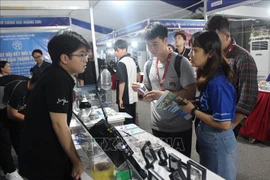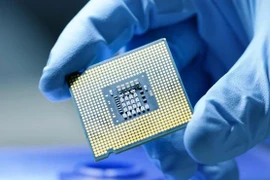Hanoi (VNA) – A recent seminar in Hanoi highlighted the critical importance of the coordination among state agencies, schools, and enterprises to the development of human resources for the semiconductor industry.
Addressing the August 9 event, Vu Hai Quan, Director of the Vietnam National University - Ho Chi Minh City (VNU-HCMC), affirmed that state agencies and enterprises’ participation in the training of the resources is extremely necessary, as it helps improve training quality, thus creating favourable conditions for graduates and meeting market demand.
Such partnerships as those between the National Innovation Centre (NIC) and the VNU-HCMC, as well as between FPT Group and educational establishments, should be expanded, he said.
FPT Chairman Truong Gia Binh said that state agencies have been working even harder than enterprises over the recent past, while universities have never embarked on training semiconductor manpower so quickly in such a short period of time.
Vietnam aims to train 50,000 semiconductor engineers, and FPT has pledged to train 10,000 of them. To do so, the firm is investing in systems from general to higher education and also working with the Republic of Korea, Taiwan (China), Japan, and the US to seek every possible way to boost training cooperation, he noted.
He stressed that there are plenty of job opportunities for semiconductor manpower, adding no matter how many of them graduate, it still not enough for FPT alone.
Binh noted the key factor helping strengthen cooperation among the State, schools, and enterprises in developing the resources is a clear mechanism for sharing information, resources, and experience.
Minister of Planning and Investment Nguyen Chi Dung perceived that the trilateral cooperation is leverage for unprecedented development and innovation in the technology sector of Hanoi. This partnership will receive much more support once the plan on developing human resources for the semiconductor industry by 2030, with a vision to 2050, that his ministry recently submitted is approved by the Government.
The official went on to say that the NIC’s coordination with domestic and international partners to build chip design training programmes is an important step on Vietnamese people’s path to master semiconductor technology.
Speaking at the seminar, Secretary of the Da Nang municipal People’s Committee Nguyen Van Quang said the central city is exerting efforts to create an optimal environment for enterprises to participate in the development of semiconductor human resources.
He added it has been implementing various solutions, with a focus on building the legal basis for devising investment attraction policies, preparing land and infrastructure, cooperating with enterprises in manpower development, and attracting chip, semiconductor and artificial intelligence experts./.
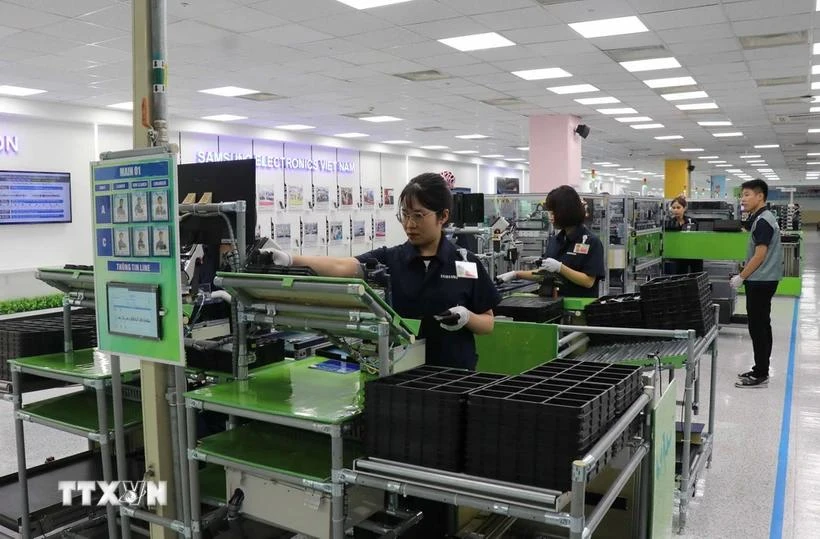
See more

Vietnam Airlines expands reach with new routes to India’s tech hubs
Since entering the Indian market, Vietnam Airlines has operated over 3,200 flights and served over 511,700 passengers. In 2024 alone, Vietnam welcomed over 500,000 Indian visitors, ranking India among its top 10 tourism markets.

Vietnamese gov’t approves two-year trial of P2P lending
Under the pilot, only P2P lending companies licensed by the State Bank of Vietnam (SBV) will be allowed to operate. Foreign banks are excluded from participation. While credit institutions and fintech firms may join the trial, participation does not guarantee future compliance with business or investment regulations once formal laws are enacted.

Vietnam eyes 18 billion USD a year for power plan through 2035
Vietnam targets being among the top four ASEAN countries for electricity reliability and in the top three for ease of electricity access.
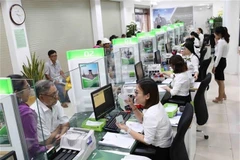
Corporate profits soar in Q1 2025, led by banking sector
According to statistics from Yuanta, market-wide revenue and post-tax profit rose by approximately 20.1% and 50.8% year-on-year, respectively, buoyed by the low comparative base of 2024.

Overseas Vietnamese help Vietnamese products go global
In 2016, approximately 4.5 million Vietnamese were residing in 109 countries and territories. Today, the figures have risen to over 6 million and more than 130, respectively. Once focused on small-scale trade, many OV entrepreneurs now own major retail centres and operate extensive wholesale networks, boosting the availability of Vietnamese products abroad.

PM orders fast-track construction of Lao Cai - Hanoi - Hai Phong railway
The Minister of Construction was asked to work closely with local authorities to hasten land clearance, compensation, resettlement, site surveys, and the drafting of a feasibility study, which must be completed by June 2025, setting the stage for the project's groundbreaking on December 19, 2025.

Vietnam cuts LNG import tariff to boost clean energy transition
The Vietnamese Government has reduced the preferential import tariff on liquefied natural gas (LNG) from 5% to 2% under Decree No. 73/2025/ND-CP, issued on March 31. The move marks a key step in accelerating the country’s shift from fossil fuels to cleaner energy.
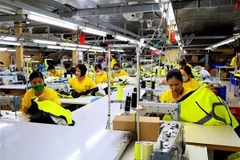
Vietnam’s labour market modernised toward deeper global integration
Through targeted measures, including more job-matching programmes, employment fairs, and job creation loans, the Government has effectively connected provinces rich in human resources with key economic hubs.
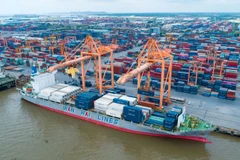
Vietnam to become second-largest economy in Southeast Asia by 2036: CEBR
Between 2021 and 2036, CEBR forecasts that the position of Vietnam in the World Economic League Table will improve considerably, with its ranking rising from 41st to 20th by 2036.
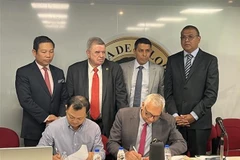
Vietnam hopes for stronger economic ties with Venezuela: ambassador
Current trade relations between Vietnam and Venezuela remain modest and are not yet commensurate with their potential, strengths, or political relationship, said Vietnamese Ambassador to Venezuela Vu Trung My.

HCM City moves closer to establishing int’l financial centre
The establishment of an international financial centre is expected to serve as a catalyst to accelerate the city’s transformation and position it for breakthrough growth in the coming years.
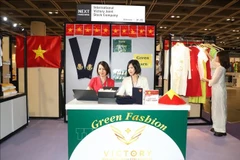
Vietnam brings breath of sustainability to Hong Kong international fashion fair
Running from April 27 to 30, the Fashion InStyle sees the participation of sustainable and eco-conscious suppliers from 19 countries and territories.
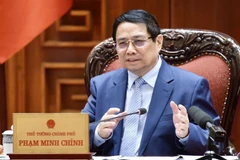
PM urges proactive engagement with US on trade talks
Trade negotiations with the US must be calm, consistent, and flexible, aiming to protect national sovereignty, security, and interests, while upholding international commitments and pursuing “balanced interests, shared risks," said Prime Minister Pham Minh Chinh.

Vietnam races against time to have EC’s "yellow card" lifted before Sept. 15
The Ministry of Agriculture and Environment particularly focused on resolving all EC concerns before September 15, the deadline for submitting a progress report to the commission, as well as ensuring thorough preparations for the fifth inspection so as to secure the removal of the “yellow card” warning.

Vietnam keen on bolstering economic ties with China's Greater Bay Area
Vietnam places great importance on advancing cooperation with the Greater Bay Area, particularly in the sectors based on Fourth Industrial Revolution technologies, said Deputy Minister of Finance Nguyen Duc Tam.
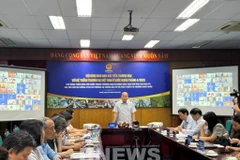
Vietnam’s trade counsellors believe in opportunities amid tariff challenges
The business community should strengthen resilience and diversify supply chains to reduce dependence on a single market for raw materials and intermediate goods, heard a hybrid conference held on April 28.

Reference exchange rate down April 29
The State Bank of Vietnam set the daily reference exchange rate for the US dollar at 24,960 VND/USD on April 29, down 4 VND from April 28.

Vietnam stimulates domestic consumption, diversifies export markets
Gaining a firm foothold in the domestic market of more than 100 million people is critically important to businesses as the domestic market, which, if properly leveraged, could help offset the decline in export orders.

Businesses urged to promote innovation in brand building
Amid global competition, branding is not just a marketing tool but also becomes a strategic factor that determines the position of enterprises and the national competitiveness.

Investment in AI in Vietnam increases eightfold
Vietnam is entering a new phase of growth, where innovation, science, and technology are at the forefront of shaping its future. From being an emerging market, Vietnam has now risen to become a strategic destination for technology investment in Southeast Asia, driven by the aspirations of the entrepreneurial community and strategic guidance from the government
